
Map as tool to represent the real world
All information is more or less geographic
+
a powerful tool to visualize information


Present the data with more dimentions
Put the field data back to the field

Interact like it's at the real-world

- Theory
- What does the map data look like for a web dev?
- A GeoJSON tool for developers
- Practice
- Create map with geometries
- Events for map interaction
- Styling
What does geographic data look like in web development?


Raster Data
Vector Data
Raster Data -> Tiled Images
256 x 256
the whole world is cut using a quadtree

Zoom Level
Scale
1
19
Globe
Street
Basemap Service
https://www.map-provider/{z}/{x}/{y}.png

Vector Data
- Point
- location of things
- geo-tagged twitts
- Line
- driving route
- river network
- Polygon
- administrative regions
- building footprints
Geographic JSON - GeoJSON
{
"type": "FeatureCollection",
"features": [
{
"type": "Feature",
"geometry": {...}
"properties": {
"name": "BuffaloJS",
"event": "Introduction to Leaflet",
"date": "12/12/2016"
}
}
]
}Point Geometry
(x, y) = (longitude, latitude)
in GeoJSON
{
"type": "Point",
"coordinates": [-79, 36]
}Line Geometry
(x1, y1), (x2, y2), ..., , (xn, yn)
in GeoJSON
{
"type": "LineString",
"coordinates": [
[-69, 35],
[-68, 45]
]
}Polygon Geometry
(x1, y1), (x2, y2), ..., , (xn, yn)
in GeoJSON
{
"type": "Polygon",
"coordinates": [
[[-69, 35], [-68, 45], [-65, 40]]
]
}(a1, b1), (a2, b2), ..., , (an, bn)
outer ring
inner ring
What if I want to
- add new properties
- check whether everything looks good
- adjust the shape of polygon
- delete wrongly placed points
- get GeoJSON from other data formats
- convert GeoJSON to other formats
- ...
geojson.io is a simple but powful tool at your hand.


an open-source JavaScript library
for mobile-friendly interactive maps
as a project for simpler web mapping by
Vladimir Agafonkin at 2008
within a greate open-source community
- Start
- Develop

- Now
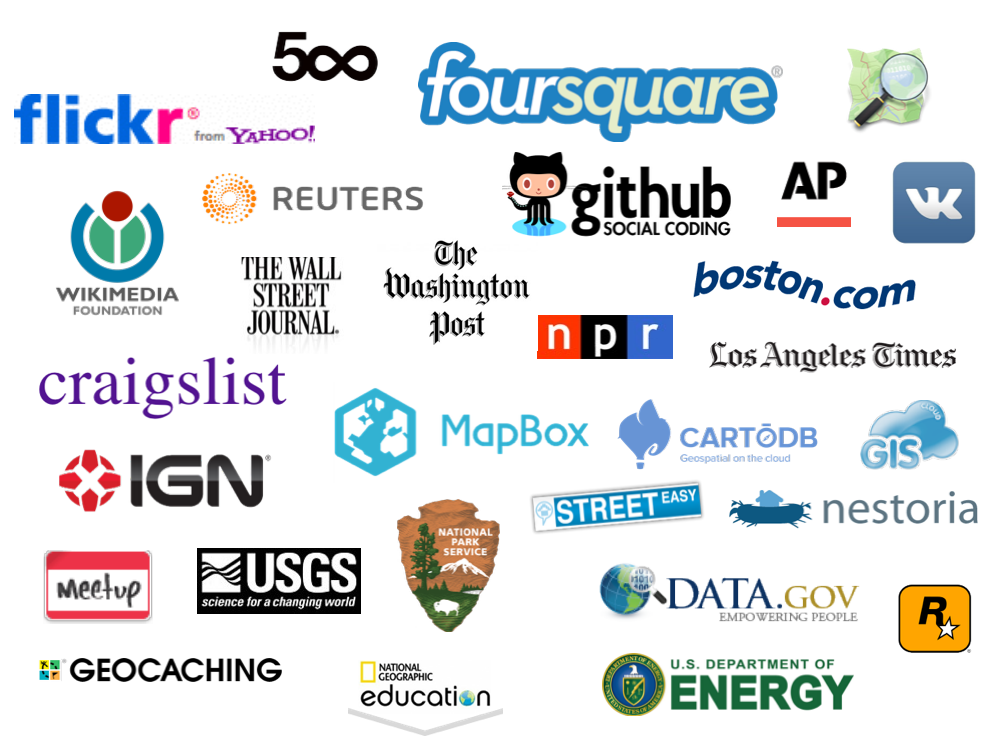
Leaflet's data model
Let's create a map with Leaflet.
- Biking in Buffalo
- Start point: UB
- address and lat/lng
- End point: downtown
- address and lat/lng
- Path
- GeoJSON
Define the map frame
<!DOCTYPE html>
<html>
<head>
<!-- load leaflet -->
<link rel="stylesheet" href="https://unpkg.com/leaflet@1.0.2/dist/leaflet.css"/>
<script src="https://unpkg.com/leaflet@1.0.2/dist/leaflet.js"></script>
<style>
body { margin:0; padding:0; }
#map { position:absolute; top:0; bottom:0; width:100%; }
</style>
</head>
<body>
<div id="map"></div>
<script>
var map = L.map('map', {
center: [42.875551, -78.869219],
zoom: 5
});
</script>
</body>
</html>
Add basemap
var basemap = L.tileLayer('http://server.arcgisonline.com/ArcGIS/rest/services/World_Imagery/MapServer/tile/{z}/{y}/{x}', {
attribution: 'Tiles © Esri — Source: Esri, i-cubed, USDA, USGS, AEX, GeoEye, Getmapping, Aerogrid, IGN, IGP, UPR-EGP, and the GIS User Community'
});
map.addLayer(basemap);
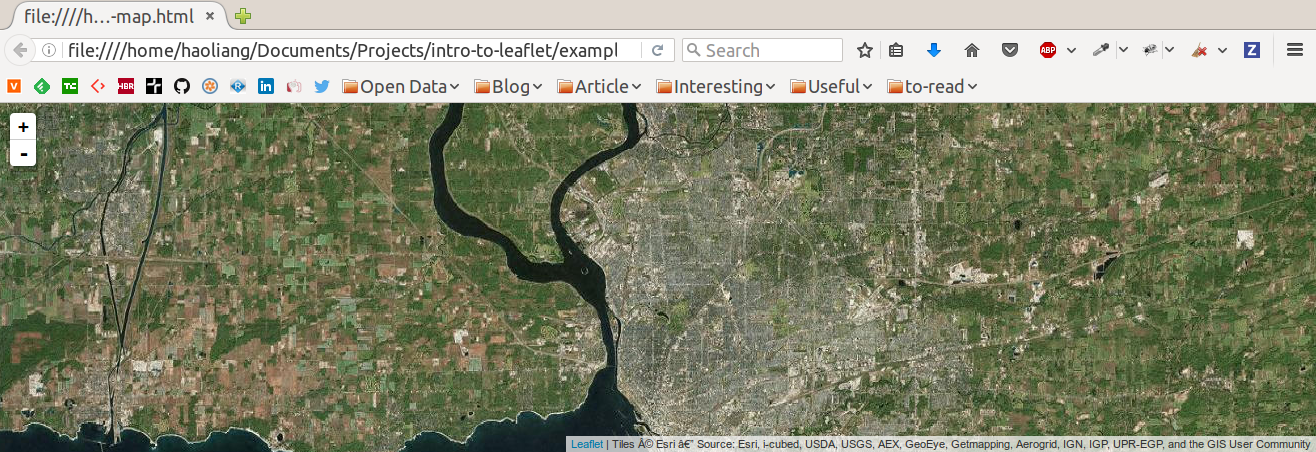
Add locations as map markers

// UB
var start = L.marker([43.000852, -78.789389]);
map.addLayer(start);
// Downtown
var end = L.marker([42.886135, -78.873784]);
map.addLayer(end);
Create path from GeoJSON
// just a geojson example
var path = {
type: 'Feature',
geometry: { type: 'LineString', coordinates: [[0, 0], [1, 1]] }
properties: {}
};
var pathLayer = L.geoJSON(path);
map.addLayer(pathLayer);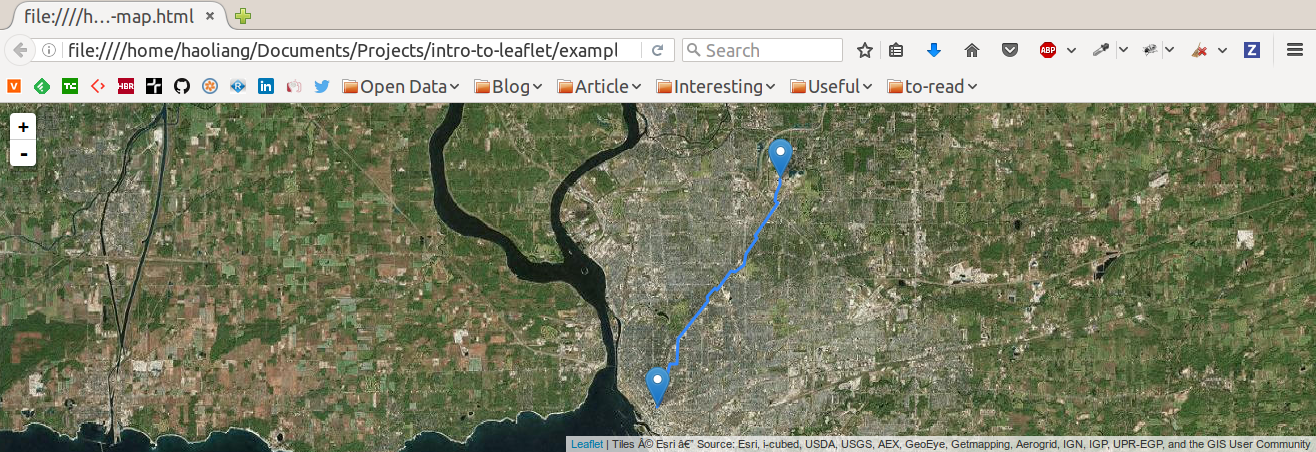
Create a map is simple like this!
Task I
Task II
Click on the start/end point to show the location information
Hover on the path to see the address of that location
But I said interactive...
Task I
Bind a popup to the marker.
var startLocation = '<h3>University of New York at Buffalo</h3>' +
'<p>Capen Hall, Buffalo, NY 14260</p>';
start.bindPopup(startLocation);
var endLocation = '<h3>Rand Building</h3>' +
'<p>14 Lafayette Square, Buffalo, NY 14203</p>';
end.bindPopup(endLocation);
Task II
- Geocode the mouse's location if it's on the biking path
- Open an popup at the mouse's location to show the geocoding result
- Close the popup if the mouse moves away from the path
var checkPoint;
pathLayer.on('mouseover', function(e) {
// current mouse coordinate
var latlng = e.latlng;
// OpenStreetMap geocoding API
var url = 'http://nominatim.openstreetmap.org/reverse?' +
'lat=' + latlng.lat +
'&lon=' + latlng.lng +
'&format=json';
// a function to send the request and return the result in a Promise
get(url)
.then(function(result) {
// create a popup and set its location and content
checkPoint = L.popup()
.setLatLng(latlng)
.setContent('<p>' + result.display_name + '</p>')
.openOn(map);
});
});
pathLayer.on('mouseout', function() {
if (checkPoint) {
// remove the popup from the map
checkPoint.remove();
checkPoint = null;
}
});
Styling
Marker Icon with Image
var startMarkerIcon = L.icon({
iconUrl: 'http://maps.google.com/mapfiles/kml/shapes/schools.png',
iconSize: [30, 30]
});
start.setIcon(startMarkerIcon);Marker Icon with... whatever
var html = '<span class="fa-stack fa-lg">' +
'<i class="fa fa-circle fa-stack-2x" style="color: #286090"></i>' +
'<i class="fa fa-building fa-stack-1x fa-inverse"></i>' +
'</span>'
var endMarkerIcon = L.divIcon({
html: html,
className: ''
});
end.setIcon(endMarkerIcon);

Styling
Set path style with svg properties
var pathStyle = {
color: '#fff',
weight: 4,
dashArray: '10, 8'
};
pathLayer.setStyle(pathStyle);
Even cooler!
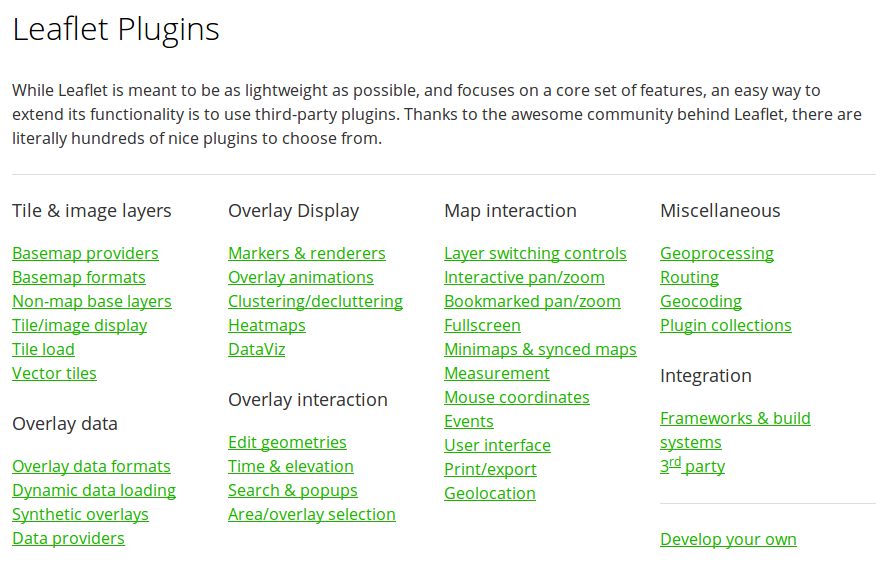
A rich collection of plugins
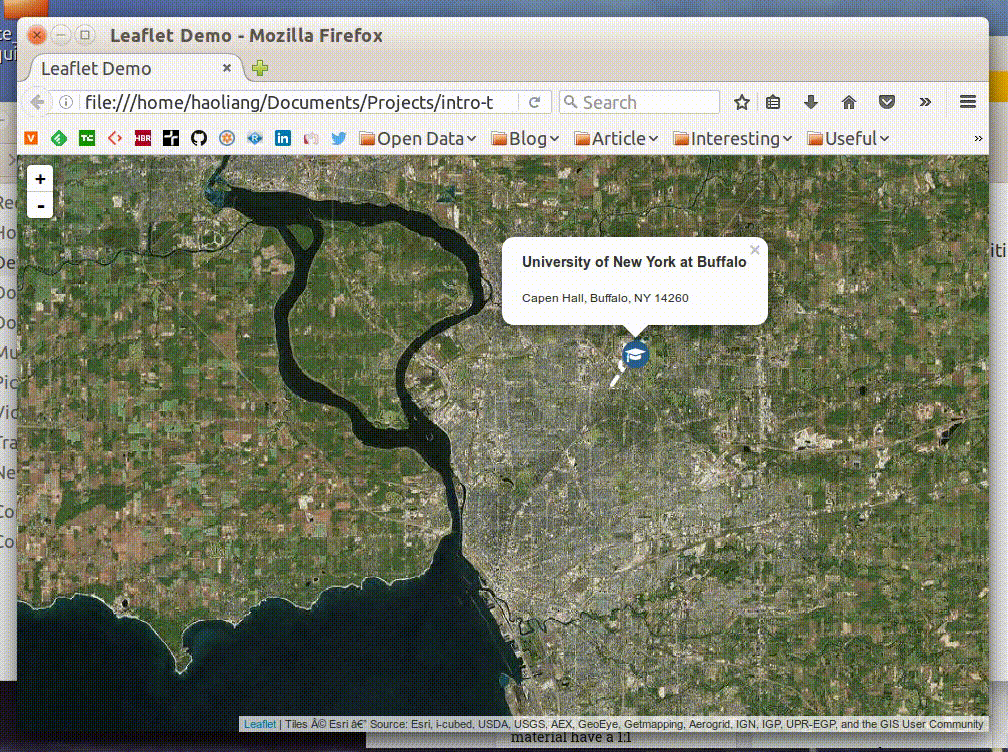
Animated Map using L.Polyline.SnakeAnim
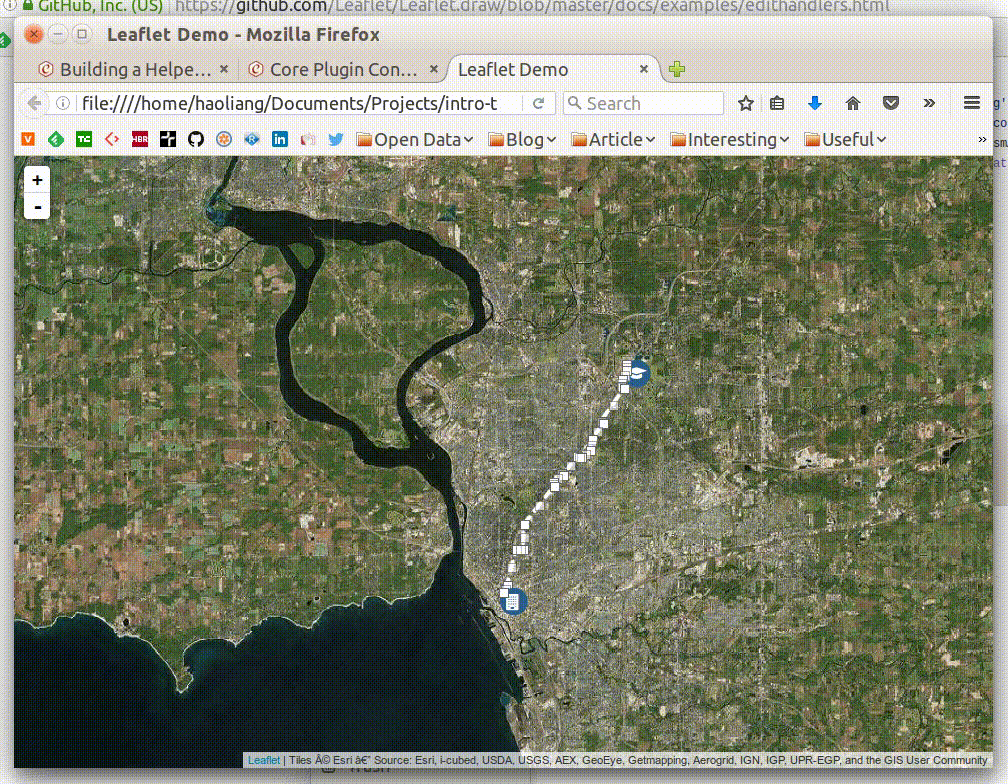
Editable Map using leaflet.draw

Yes, this is also Leaflet, by Pedro Sousa
More resources
- all map examples at github.com/haoliang/intro-to-leaflet
-
official leaflet tutorial
- map-effect-100 for more UI/UX ideas
- react-leaflet for react
- angular-leaflet-directive for angular 1.x
- angular2-leaflet-start by me ;-)
- mapbox-gl and deck.gl for high performance mapping
- more to discover...

Join MaptimeBUF for more mapping events and talks!
Thank You!
Haoliang
haoliang.yu@outlook.com